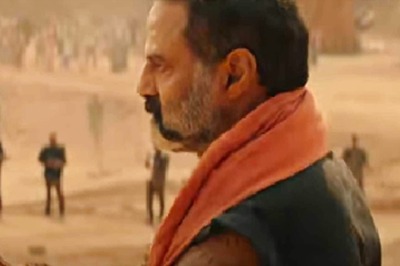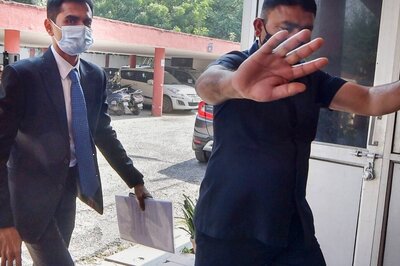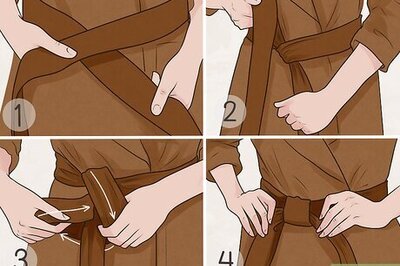
views
Bhopal: In a world infested with vitriol, a rare snippet of altruism comes as a breath of fresh air even if it doesn't have a happy ending. Such is the story of 62-year-old Abdul Jabbar, a 1984 Bhopal Gas tragedy survivor who turned crusader of justice for all victims of the carnage.
However, after fighting fiercely for the survivors of the Bhopal Gas tragedy for over 30 years, Jabbar found himself alone and neglected on his death bed at a government hospital amid apathy from the same people for whom he fought from pillar to post.
Jabbar left behind a dilapidated one room-kitchen apartment, a family of hapless four and numerous tales of his selfless deeds.
Abdul Jabbar's house in Rajendra Nagar.
Fondly known as ‘Jabbar Bhai’, he was just 27-years-old when the disaster hit Bhopal as poisonous Methyl Isocyanate leaked out of the Union Carbide India Limited pesticide plan on the intervening night of December 2-3, 1984. Then a student, Jabbar pushed a handcart to fund his education and illuminated movie posters to earn a livelihood.
On the fateful night, after taking his mother to safety in nearby Govindpura area, Jabbar rushed back to his Rajendra Nagar-based home, which is in close vicinity of the Plant, to ferry victims to the hospital, his brother Abdul Shamim Khan recollected.
“We had a scooter and Jabbar Bhai kept ferrying victims to hospitals on his two-wheeler until it ran out of petrol. Following this, we aided victims on foot,” said Shamim.
“At that time, we used to buy 5kg flour at a time and perpetually struggled to make both ends meet. I had a small eatery in Nadra Bus stand area, but it was closed in an encroachment drive,” he said.
Jabbar lost both his parents and elder brother in the 1984 tragedy. As a victim of the incident, he lost half the vision in both his eyes and developed lung fibrosis. But this only egged him on to wage a war for justice as he continued to fight for their pension, compensation, rehabilitation and medical care.
Shamim and Jabbar's family lived at their grandfather’s house in Rajendra Nagar area (Chandbar) in the Old city. The family, originally from Punjab, moved to Lucknow after partition and then shifted base to Bhopal where his grandfather worked in a cloth mill.
The tales of his benevolence are on everyone’s lips, yet he died a painful and lonely death.
“My brother kept fighting for justice for the victims from Bhopal court to Supreme Court where petitions of compensation are still pending,” said Hamida Bi, who was with Jabbar from 1984 until the day he passed away.
“No one came to help him when he was battling fatal diseases,” she said.
My brother had taught me how not to bend down and accept defeat, and I would keep attending court hearings till my last breath, said the elderly woman.
Jabbar had also participated in protests in New Delhi after the tragedy killed thousands and affected lakhs. In 1987, he established Bhopal Gas Peedit Mahila Udyog Sangthan, a survivors’ organisation demanding sustenance allowance and compensation for the victims especially widows of the gas tragedy victims.
Abdul Jabbar leading a protest over 1984 Bhopal Gas Tragedy.
After the compensation was doled out to the victims, he imparted vocational training to around 5,000 survivor women so that they could earn a livelihood for their families.
Locals often recall Jabbar’s words that criminal liability must be fixed on Union Carbide. His famous words were, “If you rent a place, you can’t leave unless you fix the mess you have created in it” hinting towards the irreparable damage the Plant did to the city of Bhopal and its people.
A Victim of the Apathy He Fought All His Life
“He was unable to walk due to Diabetes and Gangrene, yet was made to do rounds between different hospitals including Kamla Nehru, BMHRC and JP Hospital for tests,” alleged his family.
Jabbar was among those who actively participated in the representations before the Centre over the establishment of Bhopal Memorial Hospital and Research Centre (MMHRC), a medical facility dedicated to 1984 victims. He also intervened in a case where treatment was denied in local government hospitals.
“He even made calls to help others while he was bed-ridden,” one of his nephews said.
Senior Congress leader and former Chief Minister of Madhya Pradesh Digvijaya Singh had visited him in the hospital on Thursday and ensured arrangements for his treatment in Mumbai. However, it was too late as Jabbar succumbed to two consecutive heart attacks on the same day.
Keeping Riots at Bay
Jabbar’s contribution to the mitigation of the 1984 tragedy is unmatched. It was because of him the Supreme Court overturned its own verdict exonerating Union Carbide director of criminal liabilities, said senior journalist Lajjashankar Hardenia.
Women of all caste and creed came together under him to fight the injustice. It was heartening to see women holding placards, raising slogans at Jabbar’s protests, said the scribe.
Jabbar also actively carried out in measures to thwart communal riots that broke out in Bhopal in 1992. “Accompanied by Digvijaya Singh, we used to roam around all night in Old Bhopal to keep vigil and also helped victims of riots,” recollected Hardenia, adding that he was also an active participant in Bada Talab, Narmada Bachao Andolan.
A Life of Penury
Despite being at the helm of humanitarian assistance, Jabbar struggled to make both ends meet on the personal front. Occasionally he failed to pay his bills, which resulted in the electricity supply being snapped at his home. At times, Jabbar even had no means to offer tea to his guests, said Md Ansar, an old aide.
“We often had no milk when we were asked to make teat for the journalists who came to meet Jabbar at his office. Then, he used to candidly ask us to make black tea,” Ansar said.
“At times, I asked him why he can’t make money for his family and he used to tell me that he can never think of anything dishonest in his life,” said his wife Sayra Jabbar.
Another journalist said that recently Jabbar called him and asked him to visit his home and coyly asked for some financial help as his house was leaking due to heavy rains, but promised to repay at the earliest.
“He faced severe heart ailment but never let others know it,” said social activist Sachin Jain who knew him closely. He almost lost his vision once but he never let anyone know this, added Jain.
Whenever he asked for anything from close friends, it was for his organisation, said Jain, adding that he sought odd helps for paying bills of office or restoring power supply or for the mics and tents during protests, said Jain who revealed that despite slogging for treatment for six months, Jabbar never sought any help.
Senior Journalist Girish Upadhyay, too, claimed that during his cremation, when he enquired about his gangrene, his elder son Sahil said that one of his shoes had worn out and he sustained an injury. As he could not buy a new pair, his wound led to the gangrene eventually, Upadhyay said.
“Yet it was quite disheartening to see only a handful of people at his funeral and the absence of media to cover the demise of this fighter,” said Upadhyay asking whether those who devote their life for others deserve an end like this. “Have we become a thankless society, which knows nothing about giving back, asked the former resident editor of various Hindi dailies.
Family in Tatters
Jabbar’s elder son Sahil (15), who used to accompany his father to his office since he was five or six, is resolute to carry on his father’s legacy.
“I will do what my father did all his life – to help the needy,” said the teenage boy. However, his younger son Sameer (13) and Mariyam (8) have little idea about the tragedy that hit their family. Jabbar’s wife Sayra, too, affirmed that she would return to her husband’s office after three days of mourning and continue to do his work. “I have no issues if my kids lead a life like their father,” said Sayra with moist eyes, adding that she only hopes that the state and central governments will extend help to the family, including jobs to her children.
“We need Jabbar Bhai to fulfil the work he left unfinished by the man himself,” said Jabbar’s friend and colleague Sachin Jain.


















Comments
0 comment